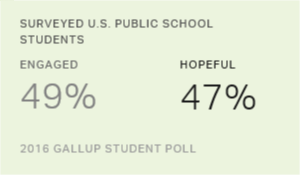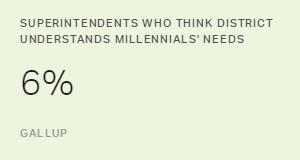What if the great boost to American education came from doing the exact opposite of standardized testing?
It's a question worth asking. For the past several decades, America (and the world) has dramatically ramped up its focus and reliance on standardized testing as a means of judging students, teachers and schools -- from kindergarten through college. No question, there will always be an important place in the education system for testing, including standardized tests. What should be questioned, however, is how much emphasis we put on tests as well as what kind of testing we should have and for what purpose.
Despite an increased focus on standardized testing, U.S. results in international comparisons show we have made no significant improvement over the past 20 years, according to the Program for International Student Assessment (PISA). The U.S. most recently ranked 23rd, 39th and 25th in reading, math and science, respectively. The last time Americans celebrated being 23rd, 39th and 25th in anything was … well, never. Our focus on standardized testing hasn't helped us improve our results!
Here's another question: What if our overreliance on standardized testing has actually inhibited our ability to help students succeed and achieve in a multitude of other dimensions?
For example, how effective are schools at identifying and educating students with high entrepreneurial talent? Or at training students to apply creative thinking to solve messy and complex issues with no easy answers?
Sir Ken Robinson, who delivered perhaps the most famous TED Talk in history, argues that schools often kill creativity. Not only that, but schools overly focused on standardized tests (and on teaching to those tests) actually kill dreams and independence -- they're no fun, they're deflating and they zap kids' energy. We may now be facing the unintended consequences of our zest to test.
The education system has long asked students to excel on standardized tests. It's high time we asked whether standardized tests have passed our collective test of what should stand as the "be-all and end-all" indicator of success in American education.
The first major wake-up call regarding this question came from one of the world's most admired employers, Google, when it announced it is no longer considering grades and test scores in its hiring practices because "they don't predict anything," as Google's former senior vice president of people operations was quoted as saying.
So what would the opposite of standardized testing look like?
Don Clifton, a professor at the University of Nebraska-Lincoln, pioneered a new field of psychology by asking a simple but powerful reframing question: What if we studied what was right with people versus what's wrong with people? That question led to a groundbreaking insight into human development: People develop (and succeed!) by focusing on their unique natural talents, not by obsessing over their weaknesses.
Thus, the field of strengths-based psychology was born, and now some 18 million-plus people around the world have discovered their talents by taking CliftonStrengths, a 60-minute online assessment that reveals a person's innate and unique combination of talents from a taxonomy of 34 CliftonStrengths themes.
What students need more than anything else is a test that is for them and about them -- one that doesn't ask them all to arrive at the same correct answer to a problem, but instead actually helps them understand how to develop their own unique talents to succeed in school and work and life. A test that gives every student a different answer.
CliftonStrengths is quite literally the opposite of standardized testing:
-
Standardized testing is designed to get every student to arrive at the same correct answer to a question, which encourages a sea of sameness. On the other hand, CliftonStrengths provides every student with a unique answer -- their own 1-in-7 billion formula for succeeding in life.
-
The way standardized tests are used today, they do more to tell us what's wrong with students by pointing out their inadequacies. CliftonStrengths does more to tell us what's strong with students by helping them discover and develop their own unique talents.
-
Most standardized tests are summative in nature; they are designed for accountability at the school, district, state and national levels. They typically do not provide individualized feedback to students, except for a single score. CliftonStrengths is formative in nature; it is designed to give each person who takes it unique feedback. It is completely individualized with insights for maximizing one's potential.
-
Standardized tests measure convergent thinking -- arriving at the same correct answer to a problem. CliftonStrengths encourages divergent or creative thinking -- generating a number of solutions to a problem (e.g., using a combination of talents in various situations).
-
Students, parents and teachers value tests that are formative in nature -- such as CliftonStrengths -- and that provide helpful, personalized feedback for students. They find much less value in summative, standardized tests that simply provide a score.
The only thing better than administering this kind of test among our students would be providing this test along with advice and coaching from their teachers, parents and fellow students.
It's time to usher in an era of strengths-based testing in America's schools and to build an ecosystem that supports and encourages strengths-based development. Standardized tests can and will play an important role in our education system, but we've put far too much emphasis on them and need to find a healthier balance with other scaffolding and stimuli for students to succeed. It's time to shift from what's wrong to what's strong.
If you'd like to join Gallup in this movement, please let us know.


